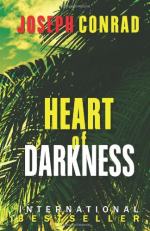|
This section contains 5,065 words (approx. 17 pages at 300 words per page) |

|
SOURCE: Kaplan, Carola M. “Colonizers, Cannibals, and the Horror of Good Intentions in Joseph Conrad's Heart of Darkness.” Studies in Short Fiction 34, no. 3 (summer 1997): 323-33.
In the following essay, Kaplan explores Conrad's treatment of race, gender, and colonialism in Heart of Darkness.
Man can embody truth but he cannot know it.” Nowhere is William Butler Yeats's adage more clearly illustrated than in the narrative of Charlie Marlow in Heart of Darkness. Throughout the text, Marlow insists upon the distinction between truth and lies; between men and women; between civilization and savagery; and, most of all, between Self and Other. Of these, the most important distinction is between Self and Other, for it is this opposition that sustains the colonial enterprise. The lure and the fear of the Other initiate the pursuit and “discovery” of colonialism; the conviction of the inferiority of the Other justifies the undertaking. Yet despite...
|
This section contains 5,065 words (approx. 17 pages at 300 words per page) |

|


